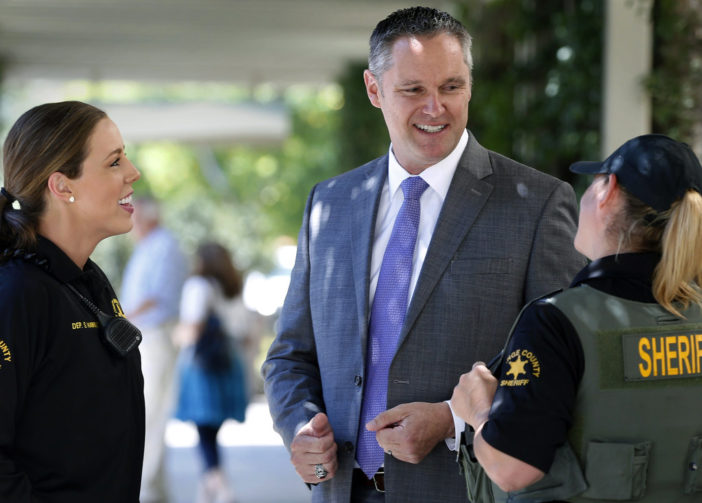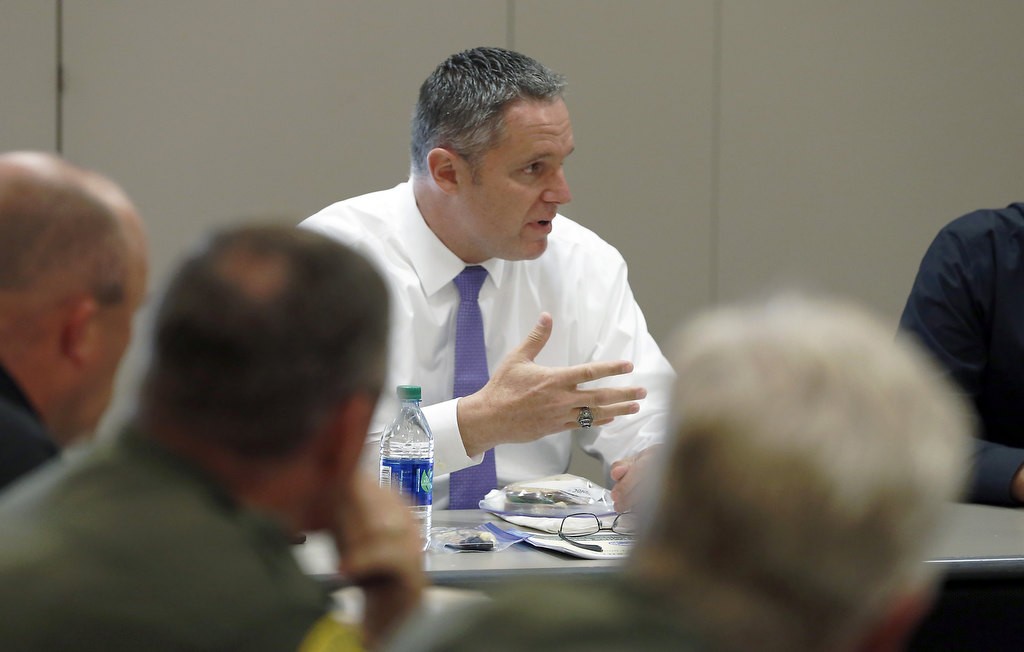The second-in-command at Orange County’s largest law enforcement agency is digging into his lunch when a deputy walks into the room.
Undersheriff Don Barnes doesn’t recognize the deputy, so he asks him his name.
“Drew.”
“Hi Drew.”
A pause.
“I’m Don, by the way. Nice to meet you.”
Barnes, the Orange County Sheriff’s Dept. No. 2 leader behind Sheriff Sandra Hutchens, isn’t dining at some overpriced, darkened haunt where power brokers speak in hushed tones in corner booths.
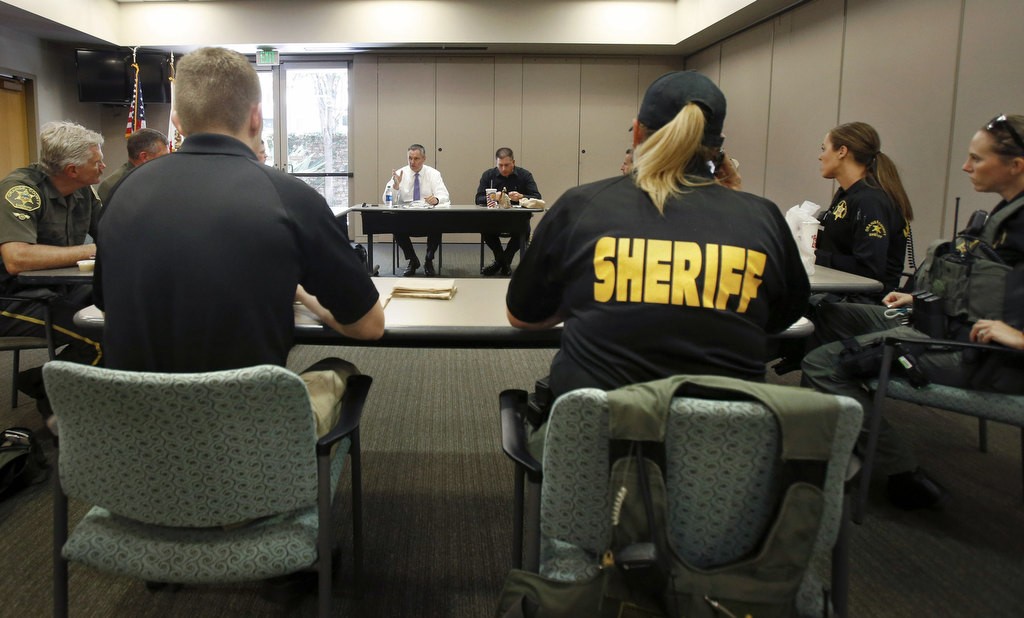
Orange County Sheriff’s Department Undersheriff Don Barnes addresses deputies during a brown bag lunch at Mission Viejo City Hall in mid-June.
Photo by Christine Cotter
Rather, he’s sitting in an unadorned conference room at Mission Viejo City Hall, breaking bread with a dozen or so members of Mission Viejo Police Services — rank-and-file deputies who aren’t used to casually mixing things up with such an agency higher-up.
The mid-June brown-bag session is part of an ongoing effort by Barnes to hear what’s on the minds of the agency’s sworn deputies and professional staff.
“Anybody got anything?” Barnes asked at the start of the 90-minute “conversation,” as he put it, the deputies sitting at tables arranged in the shape of a square — their meals ranging from takeout Mexican to sandwiches to fast-food burgers.
“What are you guys hearing?” Barnes asks them.
Barnes, 51, a 27-plus-year OCSD veteran whose leadership skills were recognized by Hutchens back in 2009, when she handpicked him to be her executive aide, was named acting undersheriff in July 2015.
He became undersheriff in January 2016.
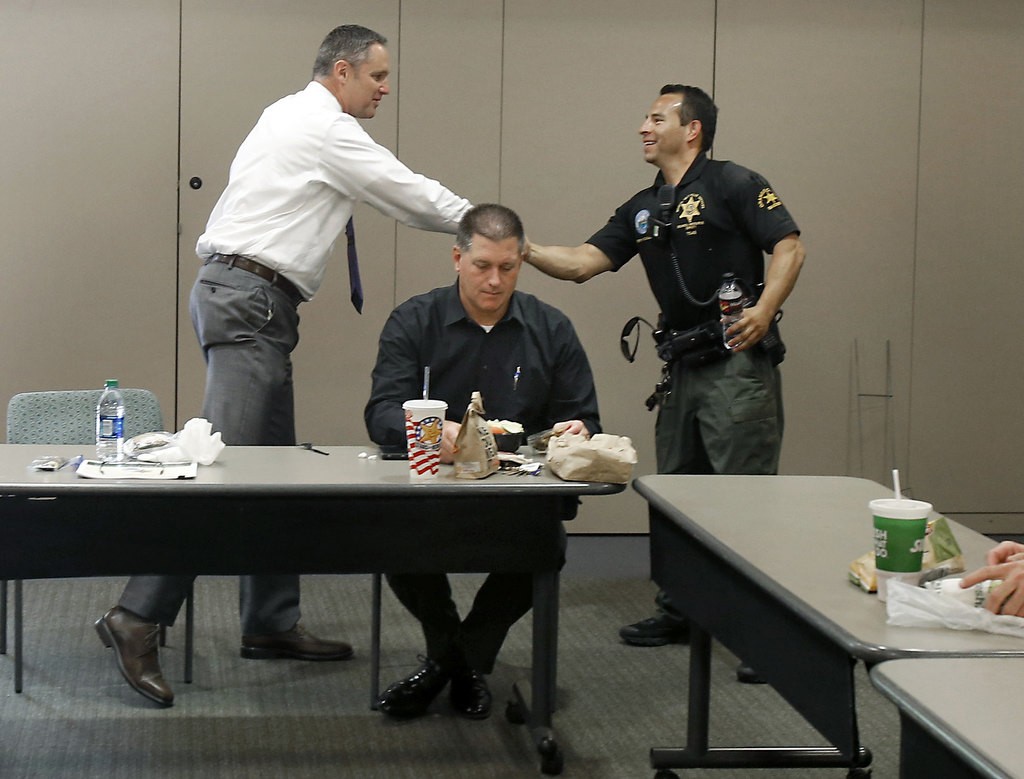
Orange County Sheriff’s Department Undersheriff Don Barnes greets deputies before a brown bag lunch at Mission Viejo City Hall.
Photo by Christine Cotter
Since then, Barnes has held more than 30 field trips — brown bag lunches, visits to jails and briefings, etc. — in an effort to better get to know the agency’s nearly 4,000 employees who serve the unincorporated areas of Orange County and 13 contract cities.
It’s a huge undertaking, but Barnes wants to keep things real — and make a clear break from the top-down management style of past OCSD administrations.
A proponent of fairness and equity, Barnes wants to turn the hierarchical organization on its head — not dismissing the importance of rank, but focusing more on the roles, responsibilities and mutual expectations of employees at all levels.
“I see my role as the most insignificant one in this organization, because there’s no position more or less important or critical than anybody else’s,” Barnes told the deputies between bites of a turkey-and-avocado sandwich on whole wheat, organic nuts, an apple and water — a lunch he made and packed himself.
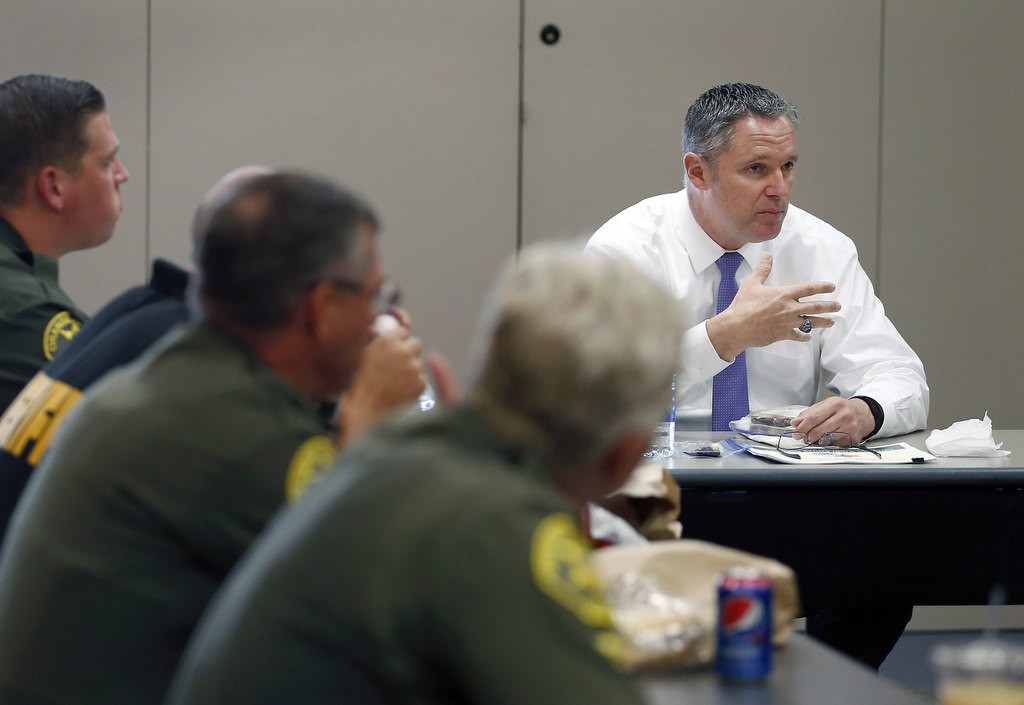
Orange County Sheriff’s Department Undersheriff Don Barnes addresses the deputies.
Photo by Christine Cotter
“We all need to make an equal contribution to public safety,” Barnes told the deputies.
Later, in a brief interview, Barnes said it’s important to “eliminate the mystique” about top OCSD management by holding casual brown-bag sessions where deputies feel comfortable asking whatever’s on their minds.
“It’s important for people to realize I’m just Don,” Barnes said. “It’s important for them to realize I’ve been them — I’ve been in their job, and I’ve faced a lot of the same issues they now are facing.”
***
Barnes has had a diverse career with the OCSD — both as a sworn deputy and member of the professional staff — that allows him to easily connect with employees of all stripes.
After ditching a planned career in mortgage banking because the job just didn’t resonate for him, Barnes joined the OCSD in 1989, attracted by the service aspect of being a deputy and the variety of duties the job entails.
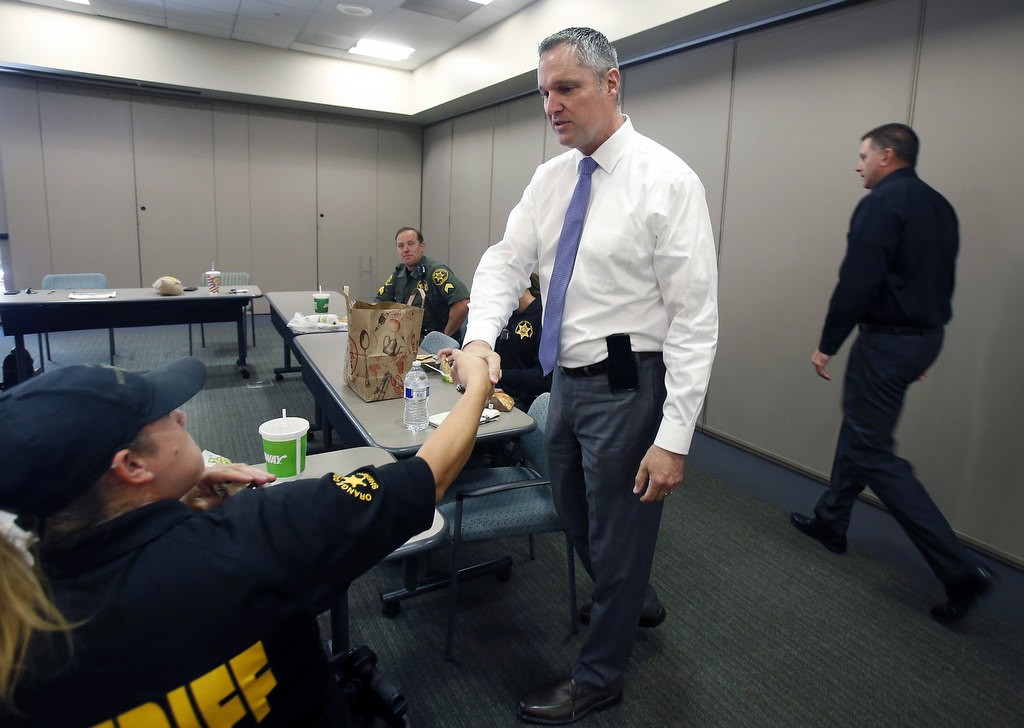
Orange County Sheriff’s Department Undersheriff Don Barnes greets a deputy who works for Mission Viejo Police Services.
Photo by Christine Cotter
Regarded within the OCSD as an analytical problem-solver, Barnes started as a patrol deputy in Lake Forest and spent several years as a deputy patrolling south O.C., where he lives with his wife. The couple has a son, 28, and a daughter, 20.
He also served as bureau commander of the O.C. Jail and helped supervise the design and construction of the Theo Lacy Facility, the OCSD’s maximum-security jail complex in Orange.
Barnes was in the third year of serving as chief of police services in Lake Forest — a job he loved — when Hutchens handpicked him to be her executive aide in 2009.
He’s been on a path toward the top ever since.
***
Barnes is blessed with a charisma and presence that draws people to him, and he happily lacks the intimidating veneer of a high-ranking executive that so often creates a barrier — perceived or real — between said executive and his or her rank-and-file employees.
In short, Barnes is just one of the guys — even though, at the Mission Viejo lunch, he wore a gray suit and purple tie.
Somehow, he made it seem like he was wearing the deputy uniforms his lunch companions were wearing, gear strapped around their waists and ready to respond to a call.
Barnes quipped that at one of his first brown-bag sessions, people were reluctant to speak up.
“There were more than 60 people watching me eat a sandwich,” he told the deputies as he sat next to outgoing Mission Viejo Police Services Chief Brad Newmyer, who manages 58 sworn employees.
The deputies soon loosened up, Barnes told the MV attendees, and the questions started flying.
“Don’t tell me what I want to hear,” Barnes told the Mission Viejo deputies to get them warmed up.
“I know we have a great organization,” he said. “I don’t need to be told we’re doing good work. Tell me something I need to hear that will make the environment better for you and give you better opportunities for success.”

Orange County Sheriff’s Department Undersheriff Don Barnes has made it a mission to get to know all OCSD employees in informal meetings.
Photo by Christine Cotter
A deputy asked about the possibility of bookings being made available at “The Farm,” the James A. Musick facility in unincorporated land next to Lake Forest and Irvine. South County deputies currently have to make the long drive up to Santa Ana to book suspects.
That’s on the horizon, Barnes said.
Another deputy asked about cities rumored to be angling to hire the OCSD for police services.
Nothing definite is in the hopper, Barnes told them.
Other queries ranged from the high standards at the Orange County Regional Training Academy and whether they are being lowered (tweaked but not lowered, Barnes said), staffing and benefits issues, to whether Barnes knew what Hutchens’ plans were as far as remaining sheriff.
Hutchens is in the second year of her second term.
Barnes said that question is premature and called Hutchens a “phenomenal” leader.
“The thing I like best about the sheriff,” Barnes said, “is she lets you do your job.”
He alluded to much-darker days at the OCSD.
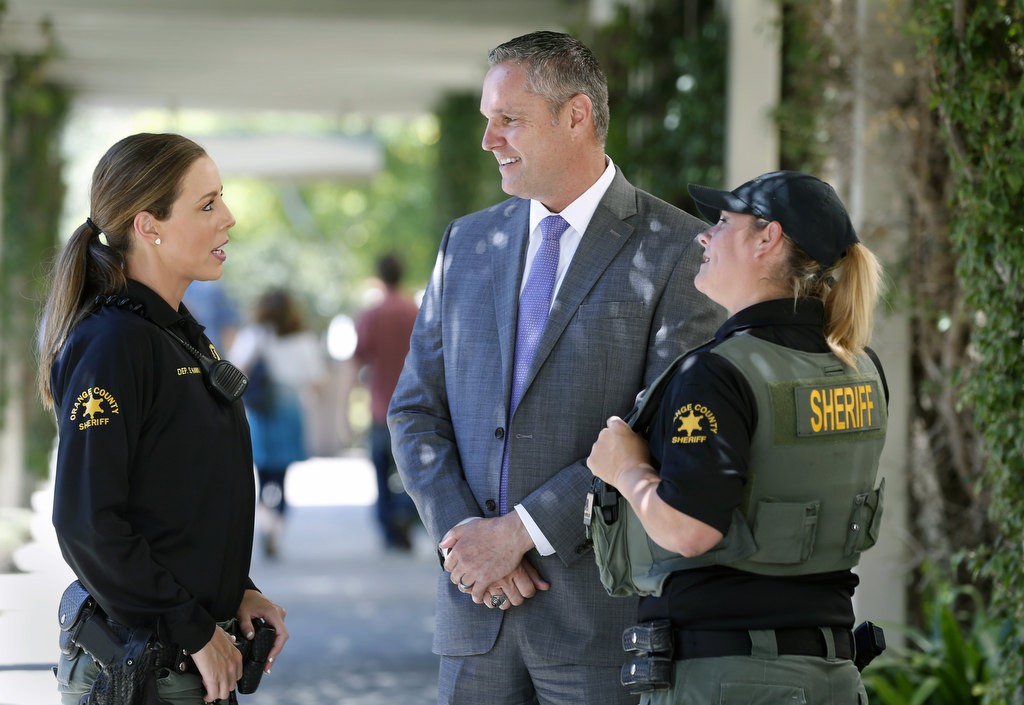
Orange County Sheriff’s Department Undersheriff Don Barnes meets with deputies before the brown-bag lunch at Mission Viejo City Hall.
Photo by Christine Cotter
“One thing I’m grateful for is the sheriff helped us get our dignity back,” Barnes said. “There was a point in time where I was embarrassed to wear this uniform. The previous administration had reduced our department down to a punch line.
“I’m proud we’re back to where being an Orange County deputy means something to the community,” Barnes added, “where we are no longer judged by the actions of one person but now are judged as a whole.”
Barnes told the deputies he’s committed to making sure they have the tools and training to do their jobs.
He urged them to speak up in the course of their daily work.
“You’ve got to bring information up,” Barnes said. “If you have ideas, as long as they are not not illegal, immoral or unethical, they’re going to be considered.”
Be innovative, Barnes urged the deputies.
Always strive for perfection but realize you never will arrive at it, he said.
He mentioned a colleague who asked him, How do you get people to want to come work for you?
“People don’t want to work for me,” Barnes replied. “They want to work in an environment where they can be successful. All you can do is create the right environment — give them the right tools, training, support and trust, and then get out of the way.”
Barnes said his expectations of the deputies and their expectations of him should be exactly the same:
“Bring forth ideas, be innovative, don’t restrict yourself,” he said. “You’re going to find tremendous support by just going out there and doing your job.”
Barnes said he will continue to regularly get out of his office at sheriff’s HQs in downtown Santa Ana to mingle with rank-and-file deputies throughout the county. He cut the amount of Executive Command Staff meetings in half to enable all the members of Executive Command to make site visits and engage with their personnel.
“These kinds of gatherings,” Barnes said, “will become so normal it will be abnormal when they don’t happen.”
 Behind the Badge
Behind the Badge
